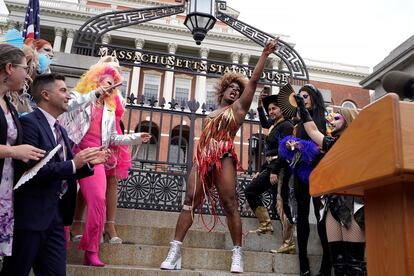Pride is back in Boston as parade returns after quarrel over inclusivity
The parade’s return comes at a time of growing hostility toward members of the LGBTQ+ community in some parts of the country

The biggest Pride parade in New England returns to Boston after a three-year hiatus Saturday, with a fresh focus on social justice and inclusion rather than corporate backing.
About 10,000 marchers signed up before registration was shut down, according to organizers. Employee groups are welcome to march, but corporations aren’t. “We really did start by looking forward to how we could best serve the LGBTQ community in greater Boston and really all across New England,” said Jo Trigilio, vice president of Boston Pride for the People.
One of the oldest Pride events in the country, this year’s parade will travel a bit shorter route than in past years, beginning at Copley Square and ending at Boston Common with a festival for families, teens and older community members. A second event for the over-21 crowd will take place on City Hall Plaza and include alcohol, a disc jockey and dancing.
This marks Boston’s first Pride parade since 2019. The hiatus began with COVID-19, but extended through 2022 because the organization that used to run the event, Boston Pride, dissolved in 2021 under criticism that it excluded racial minorities and transgender people.
The return comes amid growing hostility to members of the LGBTQ+ community in parts of the country. Some states have limited drag shows, restricted gender-affirming medical care and banned school library books for their LGBTQ content.
Boston Pride for the People, the new group formed to plan Boston’s parade, came together last September to create a more inclusive, less corporate festival, Trigilio said.
The group centers empowerment, celebration, commemoration and education, and seeks to counter Pride parades and celebrations nationwide that have become too commercial and too focused on appealing to people with privilege, said Trigilio, who uses the pronouns they and them.
“The more you have corporations involved, the more they are looking for money and that caters to the privileged,” Trigilio added. “When you have a Pride that is too commercial, it becomes a party and you lose the social justice aspect to it.”
They said Boston Pride for the People reviewed corporate funders using a number of criteria, including whether they donated to anti-LGBTQ lawmakers.
“When you’re under attack, you don’t want to be treated as a market, you want to be treated as an ally,” Trigilio said, adding that this year’s organizers wanted to make sure the parade welcomes LGBTQ people of color, trans people and those facing multiple forms oppression.
Just before the start of the parade, Mason Dunn, 37, of Tewksbury, Massachusetts, said the crowd was diverse. “All different gender identities, all different race, ethnicity, age, ability. We’re seeing a really great representation so far,” Dunn said.
Gov. Maura Healey, one of the nation’s first two openly lesbian governors, said she is excited to participate.
“This is a particularly special one to be marching in this year and at this time where we see states and some governors going backward, taking away equality, taking away freedoms, demonizing members of the LGBTQ community, hurting them, banning books, banning shows, banning access to even health care,” Healey said.
Despite being the first state to legalize same-sex marriage, Massachusetts isn’t immune to attacks on the LGBTQ community, according to Janson Wu, executive director of GLBTQ Legal Advocates and Defenders, or GLAD.
He pointed to protests targeting drag shows and harassment against children’s hospitals and physicians that provide gender-affirming health care.
“The return of Boston Pride with new and grassroots leadership is incredibly important, especially now with rising attacks against the LGBTQ community,” Wu said.
Boston Mayor Michelle Wu, a Democrat, welcomed the parade’s return, saying it’s important for Massachusetts and Boston to be “a bulwark on the frontlines in a moment of rising hate.”
Neon Calypso, 30, a Boston drag queen and trans woman of color who performed Tina Turner’s “Proud Mary” at a Statehouse raising of the Pride flag Wednesday, said she’s baffled by those trying to marginalize drag performers.
“It’s unfortunate that there are states and politicians that people empower that see something that’s so welcoming and accepting as something that’s negative,” she said. “A lot of those people who are protesting the shows, if they went, they would actually see that it’s not what they say.”
Sign up for our weekly newsletter to get more English-language news coverage from EL PAÍS USA Edition
Tu suscripción se está usando en otro dispositivo
¿Quieres añadir otro usuario a tu suscripción?
Si continúas leyendo en este dispositivo, no se podrá leer en el otro.
FlechaTu suscripción se está usando en otro dispositivo y solo puedes acceder a EL PAÍS desde un dispositivo a la vez.
Si quieres compartir tu cuenta, cambia tu suscripción a la modalidad Premium, así podrás añadir otro usuario. Cada uno accederá con su propia cuenta de email, lo que os permitirá personalizar vuestra experiencia en EL PAÍS.
¿Tienes una suscripción de empresa? Accede aquí para contratar más cuentas.
En el caso de no saber quién está usando tu cuenta, te recomendamos cambiar tu contraseña aquí.
Si decides continuar compartiendo tu cuenta, este mensaje se mostrará en tu dispositivo y en el de la otra persona que está usando tu cuenta de forma indefinida, afectando a tu experiencia de lectura. Puedes consultar aquí los términos y condiciones de la suscripción digital.








































